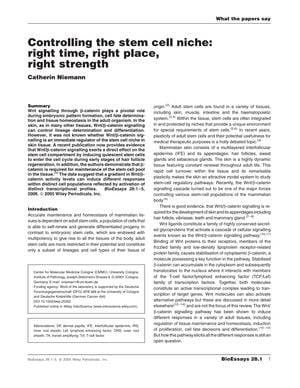Controlling the Stem Cell Niche: Right Time, Right Place, Right Strength
December 2005
in “
BioEssays
”
Wnt/ß-catenin signaling stem cells hair follicle regeneration quiescent stem cells cell cycle stem cell pool signaling gradient cell populations differentiation bulge region outer root sheath inhibitory mechanism Wnt signaling ß-catenin stem cell activation stem cell maintenance hair follicle stem cells

TLDR Wnt/ß-catenin signaling is crucial for regulating skin stem cells and hair growth, with the right levels and timing needed for proper function.
The 2005 document highlights the significance of Wnt/ß-catenin signaling in regulating stem cells within the skin, particularly for hair follicle regeneration. It reveals that this signaling pathway is essential for inducing quiescent stem cells to enter the cell cycle and for maintaining the stem cell pool. The study demonstrates that varying levels of Wnt/ß-catenin activity can lead to different responses in cell populations, with a gradient of signaling strength being key to controlling stem cell behavior—low levels for activation and high levels for differentiation. The research by Lowry et al. further indicates that stem cells from different skin lineages have different sensitivities to ß-catenin activation, which may be influenced by intrinsic regulatory factors. The bulge region of the outer root sheath shows resistance to Wnt/ß-catenin signaling, suggesting an inhibitory mechanism at play. These findings underscore the importance of precise control over the strength, timing, and location of Wnt/ß-catenin signaling for proper skin and hair follicle maintenance, with broader implications for other tissues where this pathway is active.







